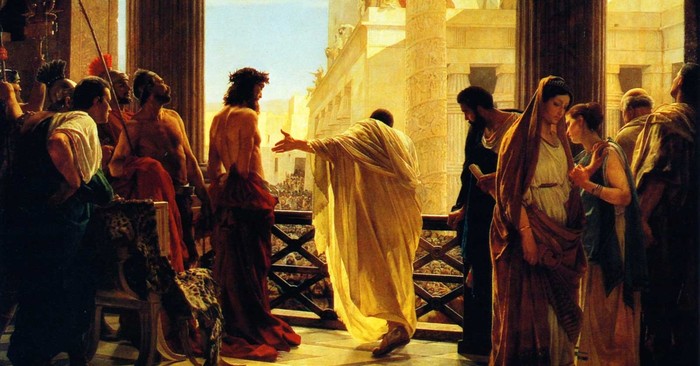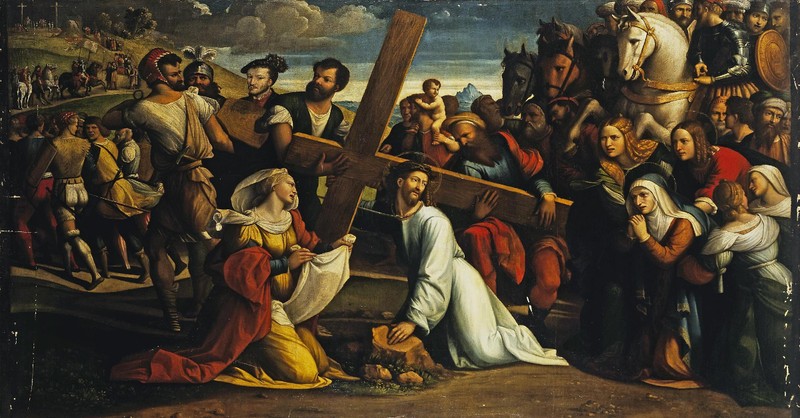
In Proverbs 17:15, we read,
He who justifies the wicked and he who condemns the righteous,
Both of them alike are an abomination to the Lord.
How does this verse apply to the trial of Jesus? Was it illegal? Did they “condemn the righteous”? A Dartmouth College professor, Richard Wellington Husband, has argued that the trial of Jesus was legal and justified. In his book, The Prosecution of Jesus, Husband says this:
“The arrest” of Jesus “was legal, for it was conducted by the proper officers, acting under instructions from the Sanhedrin. There was no illegality in the circumstances under which the arrest was affected. The hearing by the Sanhedrin was legal, for it was merely a preliminary hearing, and was not a formal trial. The course of trial in the Roman court was legal, for it harmonized with the procedure shown in the sources to be pursued by governors of provinces in hearing criminal cases.”
Against Husband, here are ten ways in which the trial of Jesus was illegal. Though this is only a summary and some points are combined. Some scholars have the number up to at least 18 reasons.
Photo Credit: Wikimedia Commons/Public Domain Image/Antonio Ciseri
1. He should have never been arrested.
Judas took a bribe from the judges. And those same judges (which included the priests and the elders) were involved in the arrest of Jesus. There was no formal charge of any crime, and no charge was presented at that moment. No warrant was given for the arrest. As the text says, “they took him.”
2. No legal proceedings should have taken place at night.
According to Jewish law:
- “Let a capital offense be tried during the day, but suspend it at night.”—Mishna, Sanhedrin IV. 1.
- “Criminal cases can be acted upon by the various courts during day time only, by the Lesser Synhedrions from the close of the morning service till noon, and by the Great Synhedrion till evening.”—Mendelsohn, “Criminal Jurisprudence of the Ancient Hebrews,” p. 112.
- “The reason why the trial of a capital offense could not be held at night is because, as oral tradition says, the examination of such a charge is like the diagnosing of a wound—in either case, a more thorough and searching examination can be made by daylight.”—Maimonides, Sanhedrin III.
According to the New Testament, Jesus was arrested and night and then immediately taken to Caiaphas, the high priest. This, we are told, took place before the rooster crowed, signaling Peter’s denial.
3. No trial for a capital offense could begin on a Friday or the day before an annual festival day.
According to Isaac Wise,
“No court of justice in Israel was permitted to hold sessions on Sabbath or any of the seven Biblical holidays. In cases of capital crime, no trial could be commenced on Friday or the day previous to any holiday, because it was not lawful either to adjourn such cases longer than over night, or to continue them on the Sabbath or holiday” (1874, pp. 67-68).
Yet this is precisely what took place. It was likely on the day before Sabbath and on the First Day of Unleavened Bread.

4. A trial for a capital offense should take more than one day.
According to the Mishnah, “If a sentence of death is to be pronounced, it a criminal charge cannot be concluded before the following day" (Mishnah, "Sanhedrin" IV, 1). This would allow for other witnesses or a defense to support the accused. But the trial of Jesus was conducted in under nine hours.
5. The judges were not impartial.
The Sanhedrin were the ones bringing the charges and the ones holding the trial. As Mendelsohn comments:
"The only prosecutors were the witnesses in the crime. The witnesses constituted the charge. There was no formal indictment until these witnesses spoke in the public assembly. When they spoke, and the evidence of two agreed together, it formed the legal charge, libel, or indictment." (Mendelsohn in "The Criminal Jurisprudence of the Ancient Hebrews," p.110)
The New Testament witness shows that the Sanhedrin were already determined to crucify him. This was hardly a fair or impartial trial.
6. The indictments against Jesus were false or unproven.
What exactly were the charges against Jesus? When He was before the Sanhedrin, the charge was blasphemy. According to Mark 14:58, two false witnesses misquoted Jesus and said he was going to destroy the temple.
Furthermore, the very fact that the Sanhedrin went looking for witnesses to accuse Jesus has the entire procedure backward. Witnesses were to bring charges, and then the trial begins. There should have been two or three witnesses, and they had to agree upon the details. But according to Matthew 26:65, the standard was not meant, but the Sanhedrin said there was no more need for witnesses.
They heard what they wanted to hear. They did not give a chance for any defense and went forward with execution based upon the testimony of false witnesses. This points to another illegal aspect…
Photo Credit: ©iStock/Getty Images Plus/leolintang
7. The verdict was unanimous.
This one feels a bit contrary to our instincts. After all, if a case is entirely simple, shouldn’t a unanimous decision be considered an open and shut case? But that was not the way Rabbinic law thought of things. As one scholar framed this:
“Contrary to reason as this rule may appear, it is founded on Rabbinic humanity and as a necessary consequence of Rabbinic law. We have just seen that, for very good reasons (n. 326), a verdict of guilty must not be rendered on the day of examination, but where all suddenly agree on conviction, does it not seem that the convict is a victim of conspiracy, and that the verdict is not the result of sober reason and calm deliberation?”
8. Jesus was not given a defense.
The law required someone to serve as defense. Jesus was given no defender. Again consider these words of Isaac Wise:
“If none of the judges defend the culprit, i.e., all pronounce him guilty, having no defender in the court, the verdict of guilty was invalid, and the sentence of death could not be executed” (pp. 74-75)
According to Deut. 13:14 the high priest was supposed to “inquire, and make search, and ask diligently.” Yet it seems as if they did this in an attempt to find people to condemn Jesus. They were not looking diligently for defenders. The law in the Mishnah says, "The judges shall weigh the matter in sincerity of their conscience" (Sanhedrin IV, 5). What happened was a far cry from that.
9. A death sentence could only be passed in a legal court.
This is what Jewish law states:
- "After leaving the hall Gazith no sentence of death can be passed upon anyone soever" (Talmud, Idolatry, Chapter 1, Vol.8).
- "A sentence of death can be pronounced only so long as the Sanhedrin holds its sessions in the appointed place" (Maimonides in "Sanhedrin" XIV).
This was a capital case, and so the Sanhedrin (every member present) would have been required to meet at the temple at the Hall of Hewn Stones. No capital sentence could be pronounced outside of this place. But according to the New Testament, this all happened at a private residence.

10. They switched charges when they stood before Pilate.
In the earlier trials of Jesus, treason was never mentioned. But they knew that Rome didn’t care about blasphemy laws. In order to have them carry out the crucifixion, the religious leaders changed the charge from blasphemy to treason. Now treason is something that Rome would care about. And Pilate, when he weighed the evidence, determined that Jesus was in no way guilty of treason (Jn 18:38, 19:4; Matthew 27:18).
Conclusion
There are other components to this that some might also consider illegal. Some have argued that the Sanhedrin members were disqualified from making any judgments. Others have focused on Caiaphas’ action of rending his clothes—this would be the action one takes when blasphemy is heard. And certainly, the assault of Jesus would throw out any semblance of justice for the accused.
Acts 2:22-24 shows us that even though these men acted in wickedness, this was all according to God’s plan and would lead to our redemption:
“Fellow Israelites, listen to this: Jesus of Nazareth was a man accredited by God to you by miracles, wonders and signs, which God did among you through him, as you yourselves know. This man was handed over to you by God’s deliberate plan and foreknowledge; and you, with the help of wicked men, put him to death by nailing him to the cross. But God raised him from the dead, freeing him from the agony of death, because it was impossible for death to keep its hold on him.
And the apostle Peter says this about the innocence of Jesus,
For it is better, if it is God’s will, to suffer for doing good than for doing evil. For Christ also suffered once for sins, the righteous for the unrighteous, to bring you to God. He was put to death in the body but made alive in the Spirit.
Photo Credit: Benvenuto Tisi - Public Domain
Originally published Monday, 06 March 2023.








